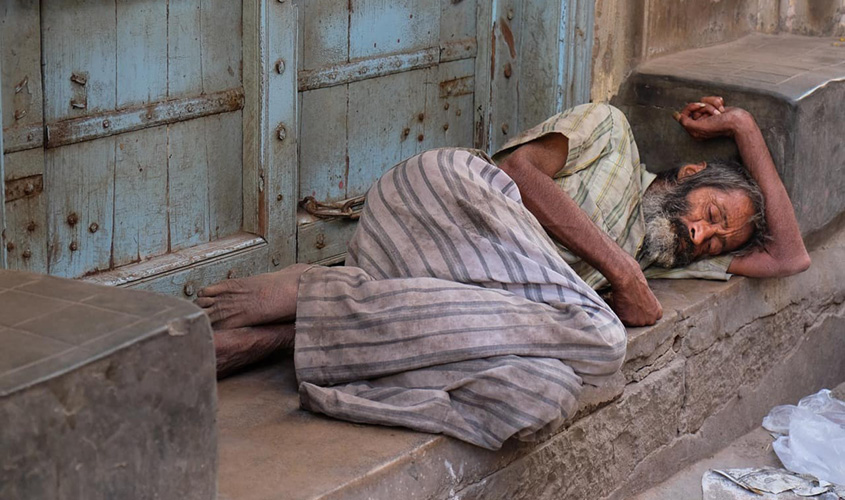New Delhi: The Aam Aadmi Party (AAP)-led Delhi government needs to take measures to protect thousands of its homeless citizens from contracting the deadly coronavirus. As of 9 a.m. on Saturday, as per data put out by the Union Ministry of Health, out of 285 cases, 22 were discharged and cured of the virus across India, four have died, while 231 people still remained active.
A range of measures have been taken by the Central government to prevent the rapid spread of coronavirus in the country. Provisions of Section 2 of the Epidemic Disease Act, 1897 have already been invoked by most Indian states. The Delhi government must issue an advisory or Standard Operating Procedure (SOP) for the protection of the most vulnerable sections in the capital.
Not only the Delhi government, even the agency—Delhi Urban Shelter Improvement Board (DUSIB)—that is responsible for operating and improving the shelter facilities for poor people in Delhi, needs to upload an SOP on its website for night shelters. The website of DUSIB doesn’t yet mention any coronavirus outbreak as if there is no such threat to the poor living in the shelters provided by the DUSIB. However, the DUSIB website was very active last year and was updating regularly when pre-poll freebies were being announced.
The DUSIB, which functions under the Urban Development Ministry of the Delhi government, is responsible for maintaining shelters for the homeless but did not bother to make a comment on the issues of rising death of homeless people in the city. The DUSIB has a budget of around Rs 50 crore for managing housing for the homeless in the city.
The Delhi government has taken strong measures against the spread of coronavirus as it has ordered a massive lockdown by shutting down all the schools and colleges, hospitals, malls, movie theaters, and many similar setups. However, the Delhi government does not seem to have shown similar concerns about the capital’s homeless citizens.
On health concerns of homeless citizens in Delhi due to the coronavirus outbreak, the Centre for Holistic Development (CHD), a non-government organisation (NGO), has urged the Delhi government to follow an action plan formulated by them to safeguard thousands of the homeless. The CHD argued that the homeless population is more prone to contract coronavirus due to cohabiting in crowded shelters.
Sunil Kumar Aledia of CHD told The Sunday Guardian: “New York has already had Covid-19 positive cases among its homeless citizens and has announced many measures to check the spread of the virus among its homeless citizens. This group of people is at high risk of contracting the virus, but the Delhi government has not said any words from them. After facing our pressure, the DUSIB issued an advisory and that is clearly not addressing our demand.”
“Outbreak of novel coronavirus across the world has shown how quickly it can spread from close proximity (less than 6ft) with people who may or may not be showing common symptoms and, therefore, the homeless populations of Delhi, living in proximity to each other inside DUSIB-owned shelters, are at a high-risk of contracting the virus,” Aledia said.
“We have suggested a range of measures that can be easily taken to prevent the virus outbreak among the homeless. The measures suggested by us include immediate testing of all individuals living inside shelter homes, providing recovery vans for the transportation of individuals to the nearest hospitals, proper record tracking by the authorities and providing sanitizers, masks, water and shops at every shelter in Delhi. Alternatively, doctors from the closest public hospitals can visit shelter facilities to conduct tests. Authorities must keep records of the number of tests conducted at their shelters and share
The Delhi government estimates that around 30,000 homeless people are living in the capital, but as per the estimate of the Housing and Land Rights Network (HLRN), a Delhi-based advocacy group, the city houses 1,50,000 homeless of whom at least 10,000 are women and the shelter facilities provided by the government are not even sufficient to accommodate all the homeless. As of now, Delhi has 300 shelter homes, including temporary shades built especially to accommodate the homeless in winter and summer. At most, these shelters can accommodate around 5,000 people. For the destitute women, there are only 21-night shelters in the capital. Asked by this reporter about the neglect of people living in shelter homes amid the coronavirus crisis, A.K. Gupta, member DUSIB, said: “We are working on a war-footing and taking all possible measures to ensure safety all the homeless in Delhi.”

